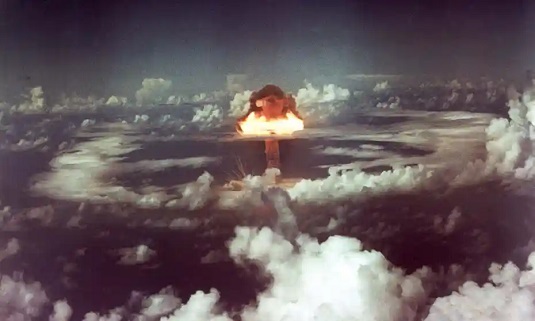Making Sense of Nuclear Psychosis

Are these people really that stupid? No. They know why NATO won't be taking up arms against Russia any time soon. Some might privately agree that a no fly zone cannot be implemented because it's a dumb idea. But they go ahead and say it anyway. But why? What possible good can come from winding up their readers and social media audiences by arguing a blossoming of mushroom clouds is worth risking to show how tough the West is?
Turning to someone who knew a thing or two about causing outrage might be helpful. Better known for planting bombs with the Rote Armee Fraktion than anything else, prior to her descent into terrorism Ulrike Meinhof was a journalist who wrote for and edited konkret. This popular and influential magazine on the emerging West German New Left gave her pause to reflect on the political economy of the press generally, and the position of the columnist. In her rasping, uncompromising style her 1968 article on 'Columnism' took on the MVPs of print media. She wrote,
The investor expects two things from columnists. They should develop their own personal reading public, preferably readers who would not buy the paper if they weren’t in it. That is the profit factor. Columnists who cannot achieve this will sooner or later lose their job. Then there’s the prestige factor. The columnist’s fenced-in but independent thinking gives the whole paper the aura of independent thinking. The columnist’s outrageousness gives the paper the aura of outrageousness. The columnist’s occasional and courageous expression of unpopular ideas gives the paper the aura of courage to express unpopular ideas.She paints a picture of the occupational hierarchy. Those doing the grunt work of minor stories and regurgitated press releases quickly learn that "they can do this, and that, and they write even if they haven’t finished thinking; they write without having read the necessary books. Good journalists turn the topic into the object, and do what they want with this object." This is writing for the sake of space filling, of shoving in blocks of text so the page looks full. It cultivates an ability to turn one's hand to almost any story. It's a frustrating, deadline-missing experience for junior hacks but those who stick it out can become the star columnist where they bring this light-minded approach to opinion pushing. For Meinhof, columnists are an editor's "best lackey", and are grateful for their elevation to this more indolent position as long as they behave "as though it were possible to have an opinion on any topic in the world, expressed in a text that is always the same length."
This is a position jealously guarded, and helps explain the obsession with cancelling. She wrote, "The publisher assigns the columnist the role of leading the readers ... Columnists cannot give their space to their readers. If they knew someone who could do a better job, they cannot ask that person to write in their place. That would frustrate the readers, who have, after all, grown accustomed to the one. Columnism is a personality cult." By creating stars, as per the Hollywood system, readers will keep coming back to buy the product and advertising space on or opposite their page can be sold at a premium. Columnism is inseparable from market logics, "we want the columnists’ freedom to be recognised for what it is: a prestige and profit factor, a fraud for the readers, self-deception ...".
You can certainly see all these traits among our media friends of radioactive fallout. The glib manner the spectre of nuclear war is passed over, as if it was no more consequential than deciding what jumper to wear that day. Knowing their offhandedness is an invitation to outrage, it keeps a brand going, guaranteeing exposure - and bankability where the papers are concerned. This might help explain the cynicism and the performative stupidity of a Dan Hodges, for example, but politicians and internet randoms? What unites Defence Select Committee chair Tobias Ellwood, EU supergrifter Femi, and youthful Blairites ostentatiously (and farcically) matching Putin's bellicose hints with nuclear threats of their own?
In the age of the internet and social media, we are all prey to columnism. Followings are an imagined approximation of social standing, an at-a-glance metric of influence and reach. The coming of the attention economy incentivises a veritable incontinence of opinion spouting. No matter how outlandish, stupidly, or self-evidently cynical the take there are audiences who lap it up. And this rough form of social capital can be traded in for economic capital, ranging from Patreons and Buy Me a Coffees to merch to paid gigs to getting taken on as a columnist. The attention economy is now vitally important for politics as well, giving outsiders a chance to make inroads into the mainstream or raising one's profile if normally overlooked in favour of more senior figures. See Oliver Dowden's recent play, for example.
Anything and everything can be a stake in the culture wars the attention economy thrives off, almost as if they don't have real world consequences. We've seen this with Brexit, Covid and the vaccination effort, and now nuclear holocaust. They are signs obeying the logics of the economy of the signs, and what they denote and connote doesn't matter as long as attention is attracted. And if it's not, they're rapidly substituted for something else that might. Ulrike Meinhof died in 1976 in apparently mysterious circumstances, but there's nothing mysterious about how columnism has escaped the pages of the press and weaved itself into the social fabric.
Image Credit